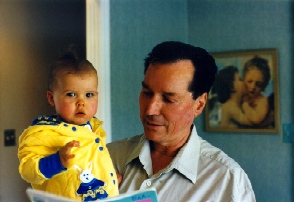|
In my counseling practice, I consult with a physician, Jim Taylor. He provides me with not only his medical expertise but also philosophical insights. His wisdom often finds its way into articles that appear in my newspaper column. At our last consultation, I asked him about people he knew who would provide an interesting interview. The first person to come to his mind was Jim Richardson. I called Jim and within two days, I was sitting with him his living room conducting the following interview. He is a most readily available person. You will find Jim an extremely successful and caring individual. Al: You have a very beautiful home that is located in a lovely part of Indiana. Jim: Well, sorry about the construction going on in the backyard. We've got it all torn-up. We are building a small town behind this house. The Standard station, the theater, fire station, and Mobil garage are finished. We are still working on the stainless steel diner and barbershop. It will cover six acres. We are calling the town, Summer Place. Al: What is your motivation behind building Summer Place? Jim: My wife and I really like kids. We have devoted our lives to working with children. We hope to be opening Summer Place to the public soon. All the revenues that we derive from Summer Place will go to support Make a Wish Foundation, We Care, Easter Seals, Riley's, and St. Jude's Hospitals. Hopefully, we will be able to raise a lot of money for these organizations. Both my wife and I love children and have dedicated our lives to helping them in whatever ways we can. Summer Place is just one way that we are doing this.
We have also started a foundation called A Home for Every Child. I want to find a home for every child on this planet. That's a pretty ambitious project, but that is my desire. I'm putting together a proposed bill for Congress that I'm personally taking to Washington and see if I can't get them to streamline the adoption procedures. The time and cost of adoptions are outrageous. In most cases, a private adoption in the States costs about $15,000. I just don't think it is right to make that kind of money on adopting children. I've drawn up a plan where churches in each county would facilitate the adoptive process. It shouldn't cost more than $1000 for an adoption. In addition to the costs and time, we found when we wanted to adopt a child that my age of fifty-six was a deterrent-even though my wife is much younger. My argument was that loving parents regardless of the age of one of them was better than growing up in an orphanage.
Al: Was there any resistance from the Russian people to your adopting a child from their country and bringing it to the States? Jim: The Russian people were really very good and beautiful people. During the Cold War, both countries tried to desensitize and demonize the people from the other nation. We thought of the them as the big, ugly Russians, and they saw us as the big, ugly Americans. We found out that they are very much like us-most of them good people. As far as the resistance to having Americans adopting, yes, definitely. But you can win them over. If they know that you will love the child and want only good for the child, they will understand and accept the adoption. We told them that she would learn the Russian language and know of the culture of her homeland. I'd learned a few words of Russian before going over there-enough that they know that I'm serious about learning their language and having our daughter learn it also.
We stayed here and worked picking tomatoes to pay the hospital bills. We didn't have very much money at all. So, we lived in barns along with the rats. We couldn't afford anything else; it was rough back then. One night a rat actually chewed off the end of my finger. But life wasn't all bad. Back then everyone was poor. However, those bleak living conditions planted within all of us a seed to do better. Those experiences provided a real education for me-a far better instruction in life than what you could get at high school or college. It also made the family very tightly knit. We'd work long hours all week, but when Sunday afternoon came along, we'd play ball and have the time of our lives. Al: How far from where we are sitting did the car broke down? Jim: Just four to five miles from here. After we paid off the hospital, my family stayed on. My father was a tenant farmer not three miles from here. He won a lot of awards for his farming abilities. I can remember driving to church, and he'd see some weeds. He'd stop and tell us to cut them out of the field. When I walk around the town that I am building, I think that only in America you can come to a state like Indiana as a tomato picker and wind-up building town in your own backyard. In this country, you can do anything that you want to do.
Al: You seem very sensitive and philosophical. Has anyone told you that you are right brain/bilateral? Are you artistic? If you are right-brain, you should have a strong streak of creativity in you. Jim: I painted portraits. Occasionally, I did landscapes, but I really preferred portraits. I liked to capture the expressions on people's faces. However, I haven't painted much since I injured my hand. Al: You are right brain. That explains why I like you. Being right brain is also good if you were ever to have a stroke. You will be able to crossover to the left side if the stroke effected the right side. Jim: It's funny that you should mention that. About six months ago, I had a small stroke on my right side of my brain. The doctors told me that I was able to crossover to the left side and made up for the affected area on the right side. Al: That is one of the benefits of being right brain-aside from everything in life is more interesting and exciting. Jim: I wake up excited about life, and I go to bed excited about the day. I can't remember when life wasn't filled with possibilities. Even when I'm sick, I look forward to life. I don't feel pain very much; I override pain with the excitement that I have for living. I'm always looking for new things to do or create.
We did a lot of little TV shows and traveled for about five years. During that time, I became close friends with a lot of people in the music business. Al: What made you come off the road? Jim:Two reasons: I got homesick, and we weren't making a lot of money. We had great times, but we often couldn't find the owners of the places in which we played after we finished our performances.
We also need to be committed to our dreams. I heard a story about an attorney who was defending someone accused of murder. The attorney in his closing remarks said that the defendant did not murder anyone. In fact, the person he is accused of murdering will walk through the doors of this courtroom in thirty seconds. The judge and the jury stared at the door, but no one came through the door. However, the attorney ended his closing statement by saying that he had proven his point and that the jury had to find his client innocent because of reasonable doubt. After all, the judge and jury looked at the door waiting to see the murder victim coming through the door. The attorney thought that he had won the case until the jury came back finding his client guilty. After the trial, the attorney asked the jury how they could find his client guilty because they all looked for the person to come through the door. They told the attorney that they did look, but the defendant didn't. Al: In addition to risk-taking and being more confident about ourselves, what have you learned about life that would help others on their journey through life? Give me three salient ideas from which others can benefit. Jim: First is to find a mentor who can be an inspiration and encourager. The second is to always make yourself available to opportunity with an open mind. The third thing is to love people and serve them. Al: What haven't you realized yet in your life? Jim: I'm disillusioned with the leadership of our country. I would like someday to see if I could make a difference in public office. Al: Are you considering running for public office in the near future? Jim: There may be a time in the next few years. Al: After you have run the course of your life, what would you like to have written on your epitaph? Jim: I heard Roy Rogers say, "To love children is to love God-to love God is to love children." If I can remembered for having loved children, I would be pleased. So, have my epitaph read: "He loved children, he loved his family, and he fought to the end."
|







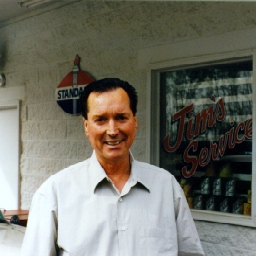
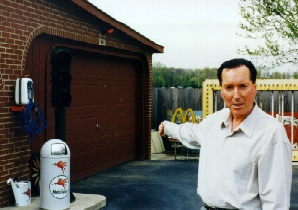
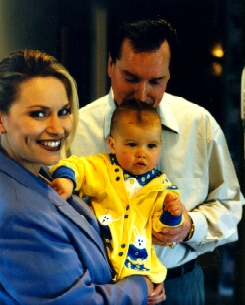 Al: I see a playpen, toys, and books
around. How did you get around the age obstacle?
Al: I see a playpen, toys, and books
around. How did you get around the age obstacle?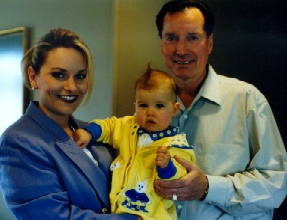 Al: How was
the Russian economy when you were over there?
Al: How was
the Russian economy when you were over there?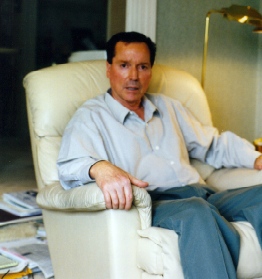 Al: Give my
readers some background on you. Where were you born and how did
you come to live in Indiana?
Al: Give my
readers some background on you. Where were you born and how did
you come to live in Indiana? 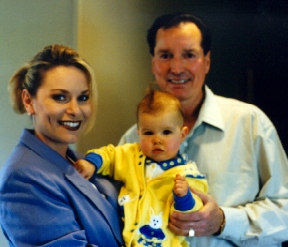 Al: Jim, tell me about your family.
Al: Jim, tell me about your family. 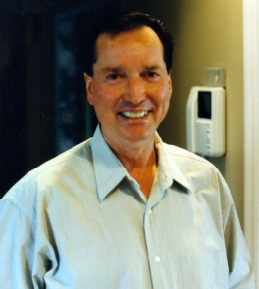 Al: What is the motivation behind this
excitement and creativity? What is it that makes Jim run?
Al: What is the motivation behind this
excitement and creativity? What is it that makes Jim run?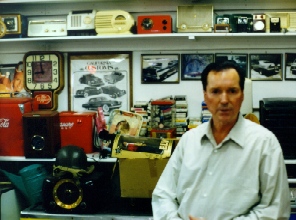 In addition, I see life in four
increments of twenty years each. From zero to twenty, you are in
your youth and getting your education. From twenty to forty, you
are adjusting to family life and responsibilities. From forty to
sixty, you are trying to pay off all the bills and get ready for
some leisure time. In that last increment, you either don't
get it or you get a little bit and then you die. When you are
young, you have just a small percentage of your life behind you
and nearly all of it ahead of you. That's why summers go by
so slowly in your youth. You live in the present. As you get
older, you have more and more time to reflect on your past and to
ponder the brevity of your future. This causes you to be
concerned as time speeds up for you. So that is one of the
reasons that I'm building the town. It is a place where you
can remember and reflect about where you have been.
In addition, I see life in four
increments of twenty years each. From zero to twenty, you are in
your youth and getting your education. From twenty to forty, you
are adjusting to family life and responsibilities. From forty to
sixty, you are trying to pay off all the bills and get ready for
some leisure time. In that last increment, you either don't
get it or you get a little bit and then you die. When you are
young, you have just a small percentage of your life behind you
and nearly all of it ahead of you. That's why summers go by
so slowly in your youth. You live in the present. As you get
older, you have more and more time to reflect on your past and to
ponder the brevity of your future. This causes you to be
concerned as time speeds up for you. So that is one of the
reasons that I'm building the town. It is a place where you
can remember and reflect about where you have been. 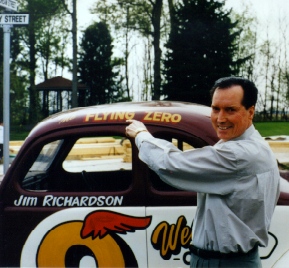 For me, the town also provides
something that I never experienced when I was growing up. Money
was tight, and my brother and I worked all the time while in
school. We didn't have a lot of free time to have fun.
Because of Summer Place, everyone will have a place to have fun,
relax, and reflect. You will be able to come to Summer Place and
consider where we have been and where we are heading.
For me, the town also provides
something that I never experienced when I was growing up. Money
was tight, and my brother and I worked all the time while in
school. We didn't have a lot of free time to have fun.
Because of Summer Place, everyone will have a place to have fun,
relax, and reflect. You will be able to come to Summer Place and
consider where we have been and where we are heading. 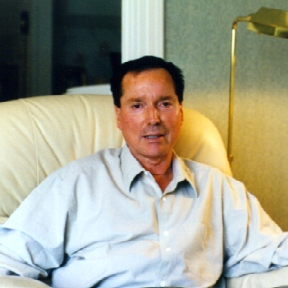 Al: What have you done to earn a living during your life?
Al: What have you done to earn a living during your life?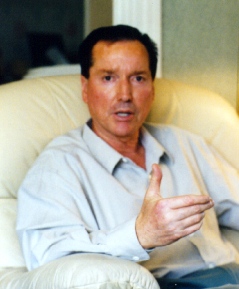 Al: After getting tired of being on the road and getting ripped off, what
did you do?
Al: After getting tired of being on the road and getting ripped off, what
did you do?